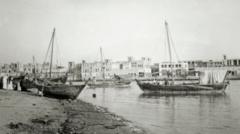In the mid-1900s, Dubai and other Arabian Gulf states had deep ties to British India, governed by Indian authority and identified as part of the colonial empire. Reports suggest that if not for a strategic decision during the era of independence, states like Dubai could have become part of India or Pakistan, reshaping the historical narrative of both regions.
### The Untold Story of Dubai's Colonial Connection to India

### The Untold Story of Dubai's Colonial Connection to India
In the 20th century, Dubai was nearly integrated into British India, a connection that has been largely forgotten.
In the winter of 1956, David Holden, a correspondent for The Times, arrived at Bahrain, then under British protection, ready to explore the Arabian Peninsula. What he found, however, was a British legacy seeped in Indian culture—evident in the customs and lifestyles of local residents. As he explored Dubai, Abu Dhabi, and Oman, he encountered representatives of 'The Raj'—an era when nearly a third of the Arabian Peninsula fell under British Indian Empire governance, from Aden to Kuwait.
Holden noted that the Arabian protectorates remained legally categorized as part of India due to the Interpretation Act of 1889. Under Indian oversight, the Gulf cities retained ties to their Indian roots; the standard practices and cultural symbols were reminiscent of their past. Even the Sultan of Oman, educated in India, showcased the cultural connections that prevailed despite the geographic and political shift.
However, by the 1920s, rising Indian nationalism began to challenge the imperial narrative of India. Subsequently, in 1937, a significant divide occurred when Aden was officially severed from British India, marking the beginning of administrative changes that would later impact the Gulf states. Despite concerns over post-independence governance in the region, Gulf territories completed their severance from Indian jurisdiction in 1947, amidst the national restructuring that accompanied the division of India and Pakistan.
Prime Minister Clement Attlee's attempts to withdraw British presence from the Arabian territories were met with resistance, prolonging British influence in the region until 1971. The remnants of 'British India' continued to exist in the Gulf, with local economies and administration still tied to Indian origins.
Today, the narrative of Dubai has evolved dramatically, from a minor colonial outpost to a thriving metropolis. The once strong connection with India has faded into obscurity, leaving behind only whispers of a history that could have changed the course of both nations. As vital ties to India recede further into the past, the memory lingers among the elderly who remember a time when their histories were intertwined with the legacy of British India.
Sam Dalrymple, the author of "Shattered Lands: Five Partitions and the Making of Modern Asia," highlights this obscure yet impactful episode of history, reminding readers how closely linked the fates of the Arabian Peninsula and the Indian subcontinent once were.
Holden noted that the Arabian protectorates remained legally categorized as part of India due to the Interpretation Act of 1889. Under Indian oversight, the Gulf cities retained ties to their Indian roots; the standard practices and cultural symbols were reminiscent of their past. Even the Sultan of Oman, educated in India, showcased the cultural connections that prevailed despite the geographic and political shift.
However, by the 1920s, rising Indian nationalism began to challenge the imperial narrative of India. Subsequently, in 1937, a significant divide occurred when Aden was officially severed from British India, marking the beginning of administrative changes that would later impact the Gulf states. Despite concerns over post-independence governance in the region, Gulf territories completed their severance from Indian jurisdiction in 1947, amidst the national restructuring that accompanied the division of India and Pakistan.
Prime Minister Clement Attlee's attempts to withdraw British presence from the Arabian territories were met with resistance, prolonging British influence in the region until 1971. The remnants of 'British India' continued to exist in the Gulf, with local economies and administration still tied to Indian origins.
Today, the narrative of Dubai has evolved dramatically, from a minor colonial outpost to a thriving metropolis. The once strong connection with India has faded into obscurity, leaving behind only whispers of a history that could have changed the course of both nations. As vital ties to India recede further into the past, the memory lingers among the elderly who remember a time when their histories were intertwined with the legacy of British India.
Sam Dalrymple, the author of "Shattered Lands: Five Partitions and the Making of Modern Asia," highlights this obscure yet impactful episode of history, reminding readers how closely linked the fates of the Arabian Peninsula and the Indian subcontinent once were.






















